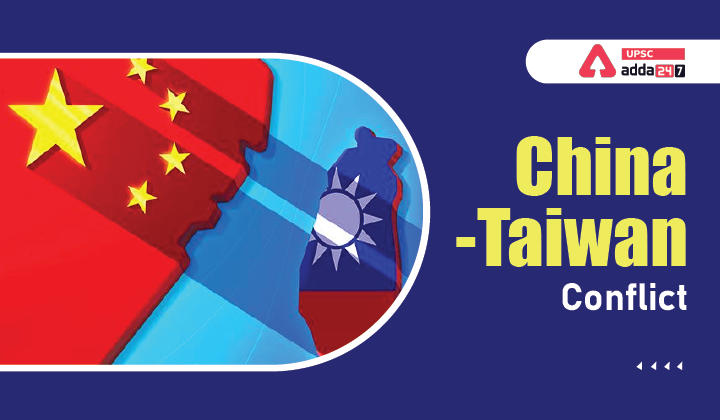Table of Contents
Conflict between China-Taiwan Relevance for UPSC Exam
General Studies II-Effect of policies and politics of developed and developing countries on India’s interests, Indian diaspora.
In News
China warns of consequences if US House speaker, Nancy Pelosi visits Taiwan.
Historical Background
- Taiwan is an island territory across the Taiwan Strait, located off the coast of mainland China.
- Separated in 1949, amid civil war China considers Taiwan a part of its territory.
- United Nations membership was continued by the ROC maintaining its permanent seat at the UN Security Council (UNSC).
- PRC allied itself with the Union of Soviet Socialist Republics (USSR) and ROC with the US in the cold war that further strained the China-Taiwan relations.
- The US and China reconciliation in the 1970s was followed by the visit of the then US President to the PRC in 1972.
- ROC was displaced by the PRC as the official representative at the UN and the “One-China Principle” came into picture.
- It further clarifies its stand to use military to control Taiwan if it becomes necessary.
- In 1980s, China put forward a formula, known as “one country, two systems”, under which Taiwan would be given significant autonomy if it accepted Chinese reunification to improve the relations between the two sides.
- Though Taiwan rejected the formula but relaxed rules related to visits and investment in China.
- Amid Beijing’s rejection to recognize Taiwan’s Republic of China (ROC) government as legitimate which prevented government-to-government contact, unofficial talks between the officials took place but that was limited as well.
- As China implemented the National Security Law in Hong Kong, the world leaders took this as a Chinese attempt to become more assertive in the region.
US-China-Taiwan- Changing scenarios
- The Shanghai Communique (1972), the Normalization Communique (1979) and the 1982 Communique speaks about the US-China mutual understanding on the Taiwan.
- The US accepted the ‘one China policy’ considering Taiwan, a part of China in 1979 though US started maintaining unofficial relations with Taiwan.
- In the 1982, China expressed its concerns over the continuous supply of arms by the US to Taiwan as per the provisions of Taiwan Relations Act (TRA),1979.
Impact on Taiwan
- The Democratic People’s Party wants to expand its economic relations away from China.
- Taiwan is centrally located in the First Island Chain between Japan and the South China Sea and has a high geopolitical significance.
- Scattered military outposts of the US in this region makes a significant breakthrough for China if it takes Taiwan’s control which makes the chances of a peaceful reunification are very grim.
Taiwan and the World
- The Republic of China (ROC), Taiwan has diplomatic relationship with 15 countries and has influential ties with countries such as Australia, Canada, EU Nations, Japan, New Zealand etc.
- Taiwan has full membership in 38 intergovernmental organizations and their subsidiary bodies, which includes World Trade Organization, Asia-Pacific Economic Cooperation, Asian Development Bankand Central American Bank for Economic
- According to One China Policy, to seek diplomatic relationship with mainland China they must break official relationship with Taiwan and the diplomatic relationship of Taiwan has seriously challenged this policy.
Countering China
- A new trilateral security partnership for the Indo-Pacific, between Australia, the UK and the US (AUKUS)
- Malabar Exercise(US, Japan, India and Australia) is also a major step towards countering the massive strategic imbalance generated by an economically and militarily powerful China.
- Warship Theodore Roosevelt has entered the South China Sea to ensure freedom of the seas, and build partnerships that foster maritime security.
India’s Stand on Taiwan
- India recognizes One China Policy and accepts Taiwan and Tibet as a part of China.
- Diplomatically India expects China to believe One India policy
- India and Taiwan do not have formal diplomatic relations but since 1995, both sides have maintained representative offices in each other’s capitals that function as de facto embassies.
What can be done?
- World powers must ensure that Chinese effort to take Taiwan by force must be tackled efficiently.
- India should continue growing economic relations and building on popular support for Taiwan in the wake of India’s troubles with China.




 TSPSC Group 1 Question Paper 2024, Downl...
TSPSC Group 1 Question Paper 2024, Downl...
 TSPSC Group 1 Answer key 2024 Out, Downl...
TSPSC Group 1 Answer key 2024 Out, Downl...
 UPSC Prelims 2024 Question Paper, Downlo...
UPSC Prelims 2024 Question Paper, Downlo...




